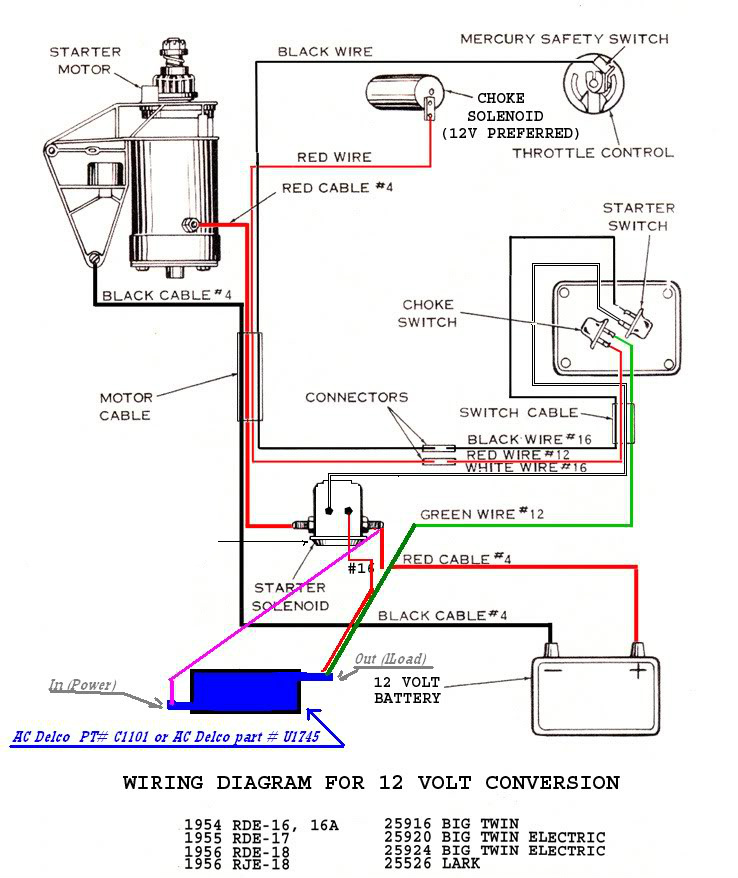Home › Forum › Ask A Member › How many amps for a 6V battery?
- This topic has 11 replies, 8 voices, and was last updated 9 years, 4 months ago by
 mr-asa.
mr-asa.
-
AuthorPosts
-
August 31, 2016 at 2:49 am #5122
Trying to get my stuff together for my Herter’s, I want to tear into the ’55 25HP Evinrude next. Plan is to go through the foot, the carburetor, inspect the ignition, then try to crank it.
I don’t particularly want to try and pull over the motor by hand, so I was going to start it. To do so I need to get the wiring and power straightened out.
I’m mildly concerned with weight as I don’t want to have to lug everything around everywhere. Can I get a couple of 6v dry cell batteries and wire them in parallel? Is there a more reliable method?
What does everyone else use when they have a motor with a starter?
August 31, 2016 at 9:03 am #43011I’ve never tried Dry Cells, but I seriously doubt they will work.
August 31, 2016 at 9:57 am #43013I like a real battery but some guys at work will do a quick test with one of those jump packs, because they ARE lighter than a real battery.
Long live American manufacturing!
August 31, 2016 at 10:04 am #43014Think 12 volt Motorcycle or ATV battery, will easily crank that one over…
http://www.richardsoutboardtools.com
classicomctools@gmail.comAugust 31, 2016 at 11:02 am #43017In 1957 Gale recommended a 6 volt 100 amp hr. battery or for 12 volt 60 amp hr.
August 31, 2016 at 3:28 pm #43037quote Richard A. White:Think 12 volt Motorcycle or ATV battery, will easily crank that one over…A 12v won’t fry anything?
August 31, 2016 at 3:54 pm #43039The dry cells won’t work – you will just damage the batteries, but 6 Volt starters work fine on 12 volts and give much faster starts, so the small motorcycle 12s mentioned by others will work, the question is how many starts do you want on a charge? and how long do you want to crank if it doesn’t start right away? like if it gets flooded? Don’t go too small. If you go to 12 volts, I recommend a resistor in series with the choke actuator to drop it to 6 volts, because if it’s held on too long with 12 volts, it will get hot and may self-destruct. The resistor should be the same Resistance as the choke actuator coil, and have a high enough power rating (Minimum Power in watts = 36/R) For a lighter, smaller, battery at a good price, I recommend the 12 Volt garden tractor batteries – Menards often has them on sale.
Note that due to the inductive nature of the starter motor, it will not draw fully twice the current at 12 volts that it does at 6 volts – Ohms law does not apply directly here. Old 6 volt cars are commonly converted to 12 volts without changing the starter.
DaveAugust 31, 2016 at 4:35 pm #43048I ran my 6V Johnson on a 12V battery for a couple of seasons. it was one of those smaller tractor batteries, as suggested above. Just make sure the motor is in good shape and runs well. If you have to crank it for more than a couple of seconds at a time, there’s something that should be fixed. I only flipped the choke quickly, so I don’t know how long it would last with constant use. I usually just used the manual choke because the configuration of my boat put me pretty close to the motor.
T
August 31, 2016 at 7:42 pm #43062I ran my 1955 Evinrude 25 hp on our pontoon. Charged a 12 volt car battery once. Stored indoors for the winter, northern Indiana here so you understand why indoors. Ran a minimum for 60 gallons of fuel in those 3 years. We would take rides up to 4 times per week, depending on the weather. Only used for starting, never charged it over that 3 year period…. Even used that battery on my truck to jump it when its battery died. Yes I had a 12 volt solenoid, and yes it was a 6 volt starter. But as previously stated, get it timed right and tuned right and the battery will last for a very long time…
http://www.richardsoutboardtools.com
classicomctools@gmail.comAugust 31, 2016 at 9:49 pm #43072 -
AuthorPosts
- You must be logged in to reply to this topic.


